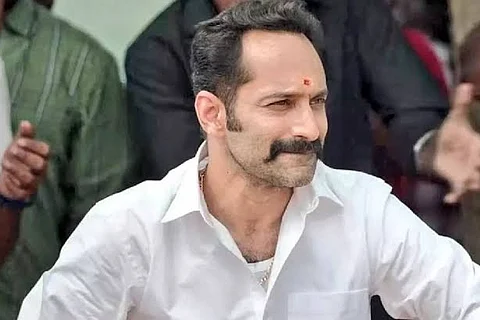

It is not unusual for Tamil cinema fans to appreciate their favourite characters from movies by editing short video clips accompanied with ‘mass’ background music to express their love towards the actor and share it on social media platforms. While it is rare for antagonists to receive the same kind of adulation, Fahadh Faasil’s character Rathnavelu from Maamannan, has now been appropriated and celebrated by dominant caste groups on social media. These groups have expressed their love to Rathnavelu’s character by creating a compilation of ‘mass’ videos, asserting their caste pride by sharing them widely on social media.
In anti-caste filmmaker Mari Selvaraj’s Maamannan, Rathnavelu, a dominant caste man subjugates a Dalit legislator Maamannan played by Vadivelu. Rathnavelu is a despicable character, who does not even flinch to ruthlessly kill his pet dogs when they do not serve his purpose. He takes pride over discriminating against people based on their caste. However, these horrible traits of Rathnavelu unfortunately seem to have struck a chord with caste supremacists.
Following Maamannan’s release on Netflix on July 27, social media posts glorifying Rathnavelu increased considerably. Despite his caste location being ambiguous in the movie, Gounder and Thevar meme pages have been quick to appropriate him by either claiming him as Rathnavelu Gounder or Rathnavelu Pandian.
Montages of Rathnavelu asserting his caste pride in the film where he does not allow Maamannan to sit as an equal before him, Rathnavelu being garlanded, and beating people up, have been compiled, elevating the character with popular ‘mass’ songs like ‘Thirupachi Aruval’, ‘Kattabomma Oorenekku’, ‘Hukkum’, and ‘Kannupada Poguthaiya’.
It should be no surprise why such a clearly antagonistic character caught the attention of online caste groups. Not too long ago, several Gounder caste groups were celebrating a man named Yuvaraj who was convicted of murdering a Dalit youth named Gokulraj for allegedly being in love with Swathi, a woman from the Gounder community. In fact, some even made comparisons between the two calling Rathnavelu the ‘reel’ version of Yuvaraj.
இப்போ புரியுதா ரத்தினவேல் Character எப்படி இவ்வளவு மாசா இருக்குன்னு..... அந்த வெள்ள சட்டை, கருப்பு பேன்ட், மீசை, குங்கும பொட்டு, நடை, உடை..... ரத்தினவேல் கவுண்டர் யுவராஜ் கவுண்டர்❤️
— கொங்கு வேளாளர்-கவுண்டர் (Kongu Vellalar-Gounder) (@KVG_Community) July 30, 2023
Reel Real pic.twitter.com/fYqLizO5Nj
Even before Maamannan released, Mari Selvaraj seemed to have ruffled the feathers of caste groups with his speech at the audio launch for the movie. He said that Maamannan was inspired by Thevar Magan and implied that it would be an antithesis to the Kamal Haasan starrer, which glorified the Thevar community. Even when the movie was released, some theatres in parts of southern Tamil Nadu, with a sizeable Thevar population, were given police protection. There was also a writ petition at the Madras High Court from a person from the Thevar community calling for a ban on the screening of Maamannan claiming that the movie might stoke communal tensions between Thevars and Devendra Kula Vellalars (a Dalit community).
Several posts also praise Rathnavelu's character for uniting dominant castes in the state like Gounders, Thevars, Vanniyars, Nadars and Chettiars. Apart from such praise for Rathnavelu, the comments and even captions of these posts took a hit at Mari Selvaraj saying ‘avan porula vechu avanaye podanum’ (you need to attack him with his own weapon) and claimed that they were ‘teaching a lesson’ to the filmmaker for portraying dominant castes as villains in his movies. It was as if these caste groups missed the point of the movie deliberately in an attempt to rile up Mari Selvaraj. These targeted attacks on Mari Selvaraj come as no surprise as his previous movies Pariyerum Perumal (2018) and Karnan (2021) did not shy away from harrowing portrayals of casteist violence perpetrated by dominant castes over their marginalised counterparts.
Amidst this glorification, there is a discussion on identifying actor Fahadh Faasil’s caste location, who is from the neighbouring state of Kerala. Controversial Hindu right-wing figure Kishore K Swamy took to Twitter to claim that Fahadh Faasil belonged to the Nadar community (a dominant caste in Tamil Nadu, classified as Other Backward Caste) and claimed that the actor’s ancestors are originally from Tamil Nadu’s Tirunelveli who later converted to Islam.
Actor Fahadh Faasil is from Nadar community , wow ok , that’s the reason for his talent then. Great.
— kishore k swamy (@sansbarrier) July 31, 2023
As, a section of the internet became flooded with posts praising Rathnavel and glorifying his horrifying actions, it appears as if this had reached the attention of Fahadh Faasil as well. The actor who had updated his Facebook cover photo with stills of him from Maamannan, was quick to remove it. This has left the internet speculating if Fahadh saw the posts glorifying his character and decided not to contribute to the discourse.